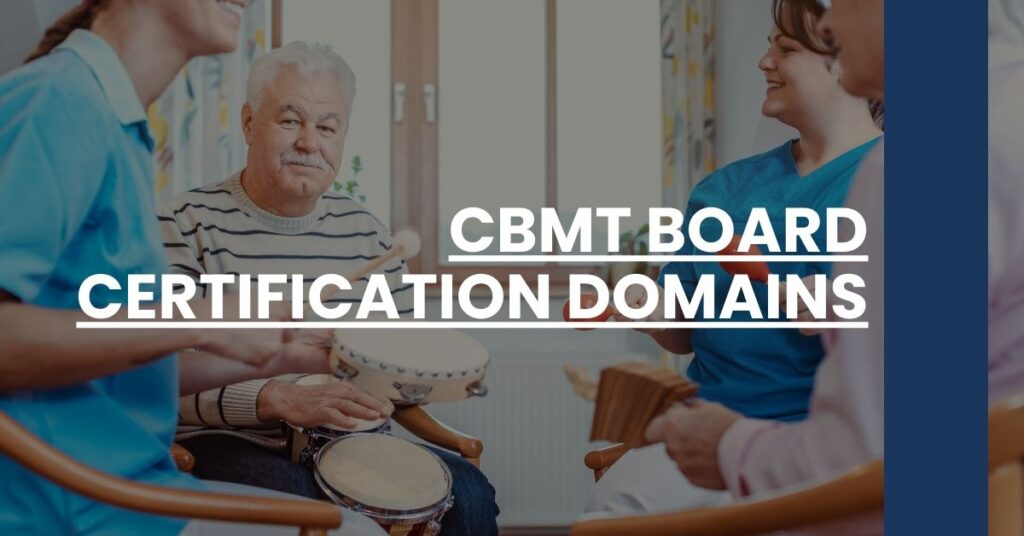CBMT Board Certification Domains establish the essential areas of knowledge and skills necessary for professional music therapists. The four domains ensure practitioners can effectively assess client needs, plan and deliver targeted interventions, and maintain robust documentation and evaluation processes.
In this article, you’ll explore:
- The role of assessment and treatment planning in tailoring therapy to individual needs.
- How the implementation and termination of treatment is critical to successful outcomes.
- Why ongoing documentation and evaluation are key for tracking progress.
- The importance of professional development in fostering ethical and collaborative practice.
Understanding these domains is vital for any music therapist striving to provide the highest standard of care.
- Introduction
- Domain 1: Referral, Assessment, and Treatment Planning
- Domain 2: Implementation and Termination of Treatment
- Domain 3: Ongoing Documentation and Evaluation
- Domain 4: Professional Development and Responsibilities
- Enhancing Skills Through Specialized Training
- Conclusion: Elevating the Profession Through Certification
Introduction
Imagine a career where you blend the healing art of music with the science of therapy to enrich the lives of others. As you consider becoming a certified music therapist, the path to achieving professional recognition through the Certification Board for Music Therapists (CBMT) is laid out before you. In the world of music therapy, CBMT board certification is a mark of excellence, asserting that you meet high standards for knowledge and competency in your field.
Earning this credential involves mastering various CBMT board certification domains, each designed to ensure that you’re equipped with the skills necessary to provide exceptional care to your clients. As you’re about to discover, these domains cover the breadth of what it takes to practice music therapy with expertise and empathy.
Domain 1: Referral, Assessment, and Treatment Planning
Treatment begins long before the first musical note is played. In this first domain, you will develop your ability to start the therapeutic process effectively. It requires a keen eye for detail and a solid understanding of how to match the theory and practice of music therapy to the unique needs of each client.
- Client Referral: Understand how to receive and interpret referrals professionally.
- Initial Assessment: Learn to proficiently assess a client’s needs, strengths, and preferences through musical and non-musical means.
- Objective Setting: Define clear goals and objectives based on initial assessment outcomes.
- Strategic Treatment Planning: Demonstrate how to formulate a plan that leverages music therapy techniques to meet client goals.
This domain ensures you can bring precision and personalization to the healing journey, beginning with the first encounter. Check out more about initial assessments and treatment plans to deepen your understanding of how to tailor your therapeutic approach to each individual’s needs.
Domain 2: Implementation and Termination of Treatment
Once a plan is established, the real work begins. This second domain focuses on your ability to take the plan and translate it into action, adapting as necessary to client responses and changing needs.
- Responsive Treatment: Carry out and adapt treatment plans with agility, ensuring relevance to the client’s ongoing situation.
- Musical Skills: Utilize a diverse range of music therapy techniques and instruments that are aligned with the client’s preferences and therapeutic goals.
- Non-Musical Considerations: Address the whole person, considering the psychological, social, and physical aspects of their being in tandem with musical interventions.
- Closure Processes: Recognize and perform appropriate termination processes once therapeutic goals are achieved.
Execution is critical, but knowing when and how to wind down the therapy process is equally important. Learning about terminations can enhance your ability to conclude therapy sessions with care, ensuring your clients are left feeling accomplished and supported. For further details on implementing treatment, visit CBMT’s page on the therapeutic process.
In the practice of music therapy, as you master these domains, your foundational skills solidify, allowing you to create more profound therapeutic experiences. However, it’s continuous documentation and professional responsibilities that maintain these experiences’ integrity, subjects we’ll expand upon as we move into the next CBMT board certification domains.
Domain 3: Ongoing Documentation and Evaluation
Effective therapy is rooted in the systematic evaluation of client progress and outcomes. Through this domain, you become adept at keeping accurate and detailed records that reflect each client’s journey. This continuous cycle of assessment and reflection is crucial for tailoring therapy to meet evolving needs.
- Accurate Record Keeping: Develop the habit of thorough documentation, including client responses and significant interactions.
- Progress Evaluation: Systematically assess client progress towards goals, modifying treatment plans as necessary.
- Feedback Integration: Utilize client and caregiver feedback to enhance therapy effectiveness.
- Data Analysis: Build skills to critically analyze therapy outcomes for reporting and research purposes.
As you refine your documentation techniques, remember that your records play a fundamental role in communicating the client’s story, paving the way to more informed and personalized care. Your diligence here emphatically supports the integrity of the cbmt board certification domains, serving as a constant reminder of your commitment to excellence.
Domain 4: Professional Development and Responsibilities
Continuous personal growth and ethical practice underpin the exceptional reputation of board-certified music therapists. In this domain, you focus on your professional evolution and dedication to the music therapy ethos.
- Ethical Standards: Commit to the highest ethical guidelines, ensuring trust and respect within the therapeutic relationship.
- Continuing Education: Engage in lifelong learning opportunities to enhance your competencies and stay current with the latest developments in music therapy.
- Advocacy and Outreach: Promote the benefits of music therapy to expand its reach and support its inclusion in healthcare settings.
- Interdisciplinary Collaboration: Partner with other professionals to provide comprehensive care and expand your impact.
By investing in your development and cultivating a robust network, you bolster the music therapy field’s credibility and ensure your practice is both contemporary and impactful. To dive deeper into lifelong learning and advocacy within music therapy, visit CBMT’s exploration of professional responsibilities.
Enhancing Skills Through Specialized Training
Beyond the foundational cbmt board certification domains, specialized training can further refine your expertise. Music therapy is a dynamic field, and supplementary training in areas such as neurologic music therapy, guided imagery and music, or the Bonny method can set you apart as a specialist in your profession.
- Specialty Certifications: Consider obtaining additional certifications that align with your practice interests and further your professional identity.
- Workshops and Seminars: Actively participate in professional development events that focus on specialized skills or emerging research in music therapy.
Tailoring your unique skill set not only enhances your service quality but also positions you as a music therapy thought leader. The proactive approach to continuing education is a hallmark of the commitment that CBMT board certification represents.
Conclusion: Elevating the Profession Through Certification
CBMT board certification domains provide a structured framework that ensures you are equipped with a holistic set of skills for professional practice. The rigorous process of obtaining and maintaining your MT-BC credential challenges you to constantly evolve and adapt, reflecting the ever-changing healthcare landscape.
The certification communicates a promise of quality and competence to clients, colleagues, and the broader community, making it a cornerstone of your professional identity. As you continue to grow within these domains, you become a testament to the transformative power of music therapy, furthering the field and touching lives through your work.
Achieving and maintaining your MT-BC credential is an ongoing journey—one that requires dedication, skill, and passion. But the rewards are immeasurable, for both you and those whose lives you enrich with your practice. Embrace the challenge, and take pride in knowing that you’re contributing to an esteemed group of professionals who make a difference every day.
Be sure to review the extensive information available on CBMT’s website to deepen your knowledge and preparation for board certification. Undoubtedly, the journey you embark upon to master the cbmt board certification domains is both a professional milestone and a personal triumph in your career as a music therapist.
CBMT Board Certification domains ensure music therapists are assessed for comprehensive skills in client care and professional competency.

